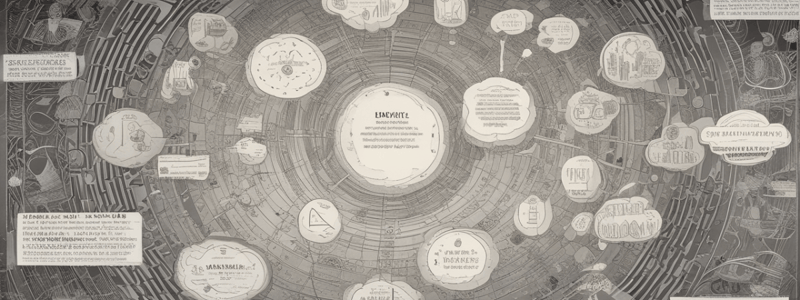Podcast
Questions and Answers
What is the main objective of expository research?
What is the main objective of expository research?
- To identify social variables in the environment
- To provide information for proposing theories and predicting future events (correct)
- To present an interpretive explanation of social phenomena
- To develop conclusions without factual evidence
In expository research, the researcher seeks to __________.
In expository research, the researcher seeks to __________.
- Develop factual evidence to support theories (correct)
- Identify various philosophical foundations
- Explore social phenomena with a subjective viewpoint
- Conduct experiments to establish causality
What distinguishes expository research from other qualitative research strategies?
What distinguishes expository research from other qualitative research strategies?
- It prioritizes intuitive insights over data collection
- It aims to provide a detailed historical account
- It focuses on generating subjective interpretations
- It involves presenting a factual description without opinions (correct)
Which of the following best describes the role of theory generation in expository research?
Which of the following best describes the role of theory generation in expository research?
What is one of the key benefits of expository research for investigators?
What is one of the key benefits of expository research for investigators?
How does data collection in expository research contribute to the research process?
How does data collection in expository research contribute to the research process?
What is a key difference between qualitative and quantitative research methodologies?
What is a key difference between qualitative and quantitative research methodologies?
What is a characteristic of how researchers operate in qualitative research, according to the text?
What is a characteristic of how researchers operate in qualitative research, according to the text?
Which aspect of research is influenced by axiology in qualitative research?
Which aspect of research is influenced by axiology in qualitative research?
What is a common characteristic of researchers in qualitative research in terms of language and style of writing?
What is a common characteristic of researchers in qualitative research in terms of language and style of writing?
How do researchers in qualitative research differ from those in quantitative research in terms of their perceptions of reality?
How do researchers in qualitative research differ from those in quantitative research in terms of their perceptions of reality?
What type of relationships do researchers in qualitative research tend to follow in their data analysis, as mentioned in the text?
What type of relationships do researchers in qualitative research tend to follow in their data analysis, as mentioned in the text?
What was the purpose of adapting the Labov narrative evaluation model by Cortazzi?
What was the purpose of adapting the Labov narrative evaluation model by Cortazzi?
What distinguishes top-down methods from bottom-up methods in narrative analysis?
What distinguishes top-down methods from bottom-up methods in narrative analysis?
What function of narrative and discourse analysis did Merrell (1982) emphasize in the early three-function model?
What function of narrative and discourse analysis did Merrell (1982) emphasize in the early three-function model?
What is the approach followed most often in ethnographic research for narrative analysis?
What is the approach followed most often in ethnographic research for narrative analysis?
Which method of narrative analysis is used extensively in educational settings according to the text?
Which method of narrative analysis is used extensively in educational settings according to the text?
In narrative analysis, what do bottom-up methods primarily use elements within the text for?
In narrative analysis, what do bottom-up methods primarily use elements within the text for?
What is the primary purpose of expository research?
What is the primary purpose of expository research?
Which role do expository strategies play in qualitative research?
Which role do expository strategies play in qualitative research?
What is a key characteristic of interpretive research according to the text?
What is a key characteristic of interpretive research according to the text?
In qualitative research, what is one purpose of expository studies?
In qualitative research, what is one purpose of expository studies?
What is a key difference between quantitative and qualitative research in terms of generalizability?
What is a key difference between quantitative and qualitative research in terms of generalizability?
What distinguishes expository studies from exploratory research in qualitative research?
What distinguishes expository studies from exploratory research in qualitative research?
Why might interpretive research theorists disagree with explanatory research?
Why might interpretive research theorists disagree with explanatory research?
What is the focus of interest for qualitative researchers during a study?
What is the focus of interest for qualitative researchers during a study?
In qualitative research, which of the following aspects is considered as important as the original phenomenon of interest?
In qualitative research, which of the following aspects is considered as important as the original phenomenon of interest?
Which broad classes can qualitative research strategies be grouped into?
Which broad classes can qualitative research strategies be grouped into?
Which of the following qualitative research strategies involves understanding the meaning behind phenomena?
Which of the following qualitative research strategies involves understanding the meaning behind phenomena?
What is a common characteristic of quantitative research designs that qualitative research strategies roughly correspond to?
What is a common characteristic of quantitative research designs that qualitative research strategies roughly correspond to?
Flashcards are hidden until you start studying
Study Notes
Qualitative Research Strategies
- Expository research is defined as studies that develop a detailed explanation of some social phenomenon, circumstance, or consequence.
- The researcher identifies a specific social phenomenon, investigates its causes, and seeks to explain it through a detailed description of the social, economic, and political context.
- The ultimate goal of expository research is to give the researcher enough information to propose a theory or theories that can explain an event, outcome, or phenomenon.
Characteristics of Qualitative Research
- Researchers assume that multiple, subjectively derived realities can coexist.
- Researchers overtly act in a value-laden and biased fashion.
- Researchers often use personalized, informal, and context-laden language.
- Researchers tend to apply induction, multivariate, and multi-process interactions, following context-laden effect relationships, with context-free methods.
Differences between Qualitative and Quantitative Research
- A key difference lies in the epistemology of the two approaches.
- Qualitative research designs involve interacting with individuals in the groups being studied.
- Researchers record not only what they see but also their interpretations of the meaning inherent in the interactions.
Narrative Analysis
- Cortazzi (1993) adapted the Labov narrative evaluation or analysis model to illustrate how informal styles of narrative correlate with a number of extant social characteristics.
- Top-down approaches analyze the narrative text according to a set of culturally established rules of grammar and exposition.
- Bottom-up methods use elements in the text to build a structure for analysis.
Functions of Narrative and Discourse Analysis
- Merrell (1982) provided an early three-function framework of narrative and discourse analysis that is still relevant today.
- The three functions are: expressive, serving to convey emotions or thoughts; stimulative, serving to stimulate a response; and declarative, serving to convey information.
Interpretive Research
- Not all research theorists agree that human events or actions can be defined by causal explanations and conclusions.
- Interpretive research is used to understand human action by studying the meaning and interpretation of events.
Critical Research
- Critical research is a type of qualitative research that involves critiquing and challenging dominant ideologies, power structures, and social norms.
- Critical research is not discussed in detail in this text, but it is a key strategy in qualitative research.
Comparison with Quantitative Research
- Qualitative research is often used as a means of gathering fundamental information about a topic, its contributing factors, and the influences it might have on various outcomes.
- Qualitative research is less generalizable than quantitative research, as it focuses on understanding the meaning and context of a phenomenon rather than applying results to other situations.
Studying That Suits You
Use AI to generate personalized quizzes and flashcards to suit your learning preferences.




